Discover top guides, trends, tips and expertise from AIO Writers
15 Best Do It Yourself SEO Tools to Boost Your Rankings
Julia McCoy
Thursday, 16th May 2024
So you’ve decided to take control of your own search engine optimization (SEO) instead of outsourcing.
There are a plethora of do it yourself SEO tools available that can help boost your search rankings, draw more traffic to your website, and increase your conversions.
Whether you’re a blogger aiming to increase your readership or a small business owner wanting to draw in new clients, this guide will help you build your own DIY SEO toolkit.
Here are 15 of the most powerful do it yourself SEO tools that will help you conquer the search results and leave your competition in the dust.
Table Of Contents:
15 Best Do It Yourself SEO Tools
Want to do your own search engine optimization instead of hiring out?
You’ve come to the right place.
I’ve been doing SEO for over a decade now, and I can tell you firsthand – having the right tools in your arsenal is a game-changer.
With the best DIY SEO software, you can:
- Boost your search engine rankings
- Drive more organic traffic to your site
- Optimize your website content for target keywords
- Analyze your competitors’ SEO strategies
- Track your keyword rankings over time
- Find link-building opportunities
- And so much more
But here’s the thing – there are a TON of SEO tools out there.
It can be overwhelming trying to figure out which ones are worth your time and money. That’s why I’ve put together this list of my top 15 favorite do it yourself SEO tools.
These are the tools I use day in and day out to get results for my own sites and my clients’ sites. So whether you’re a total SEO newbie or a seasoned pro, you’ll find something on this list to level up your search optimization game.
Let’s dive in.
Keyword Research Tools
Our first category is keyword research. Keywords are the backbone of any SEO strategy because they serve as the primary connection between what people are searching for and the content you provide to meet those needs.
Adding keywords to strategic places in your content increases the likelihood that your website will appear in relevant search results, making it easier for potential visitors to discover your site.
These four keyword research tools can help you unearth those keyword gems that can propel your website to the top of search engines.
1. BrandWell Keyword Research Tool
If you’re looking for a free, no-frills keyword research tool, then you’ll find one inside BrandWell. I say free because it comes with your BrandWell subscription at no extra cost.
Powered by the Mangools API, this keyword explorer can generate hundreds of key phrases that you can immediately turn into complete blog posts or save in your content planner for later use.
All you have to do is enter a seed keyword and it will come up with a list of related keywords along with data on monthly search volume, ranking difficulty, cost per click, and trends.
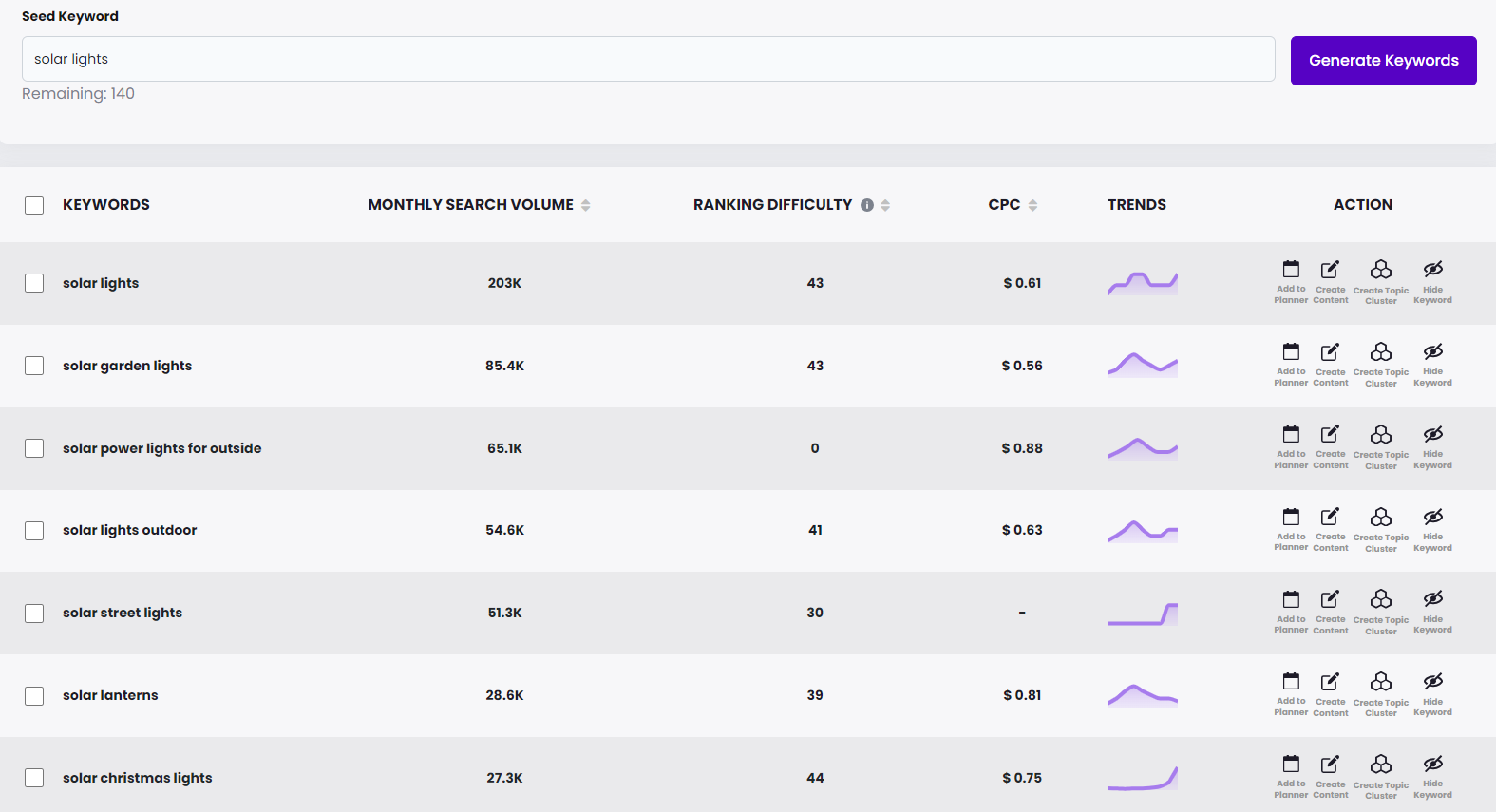
2. Ahrefs
Ahrefs is another SEO powerhouse that offers a free keyword generator. One of its key features is its extensive keyword database, which provides access to billions of keywords across various languages and regions.
Like the BrandWell keyword tool, the free version of the Ahrefs keyword generator displays basic data such as search volume, keyword difficulty, and click-through rates.
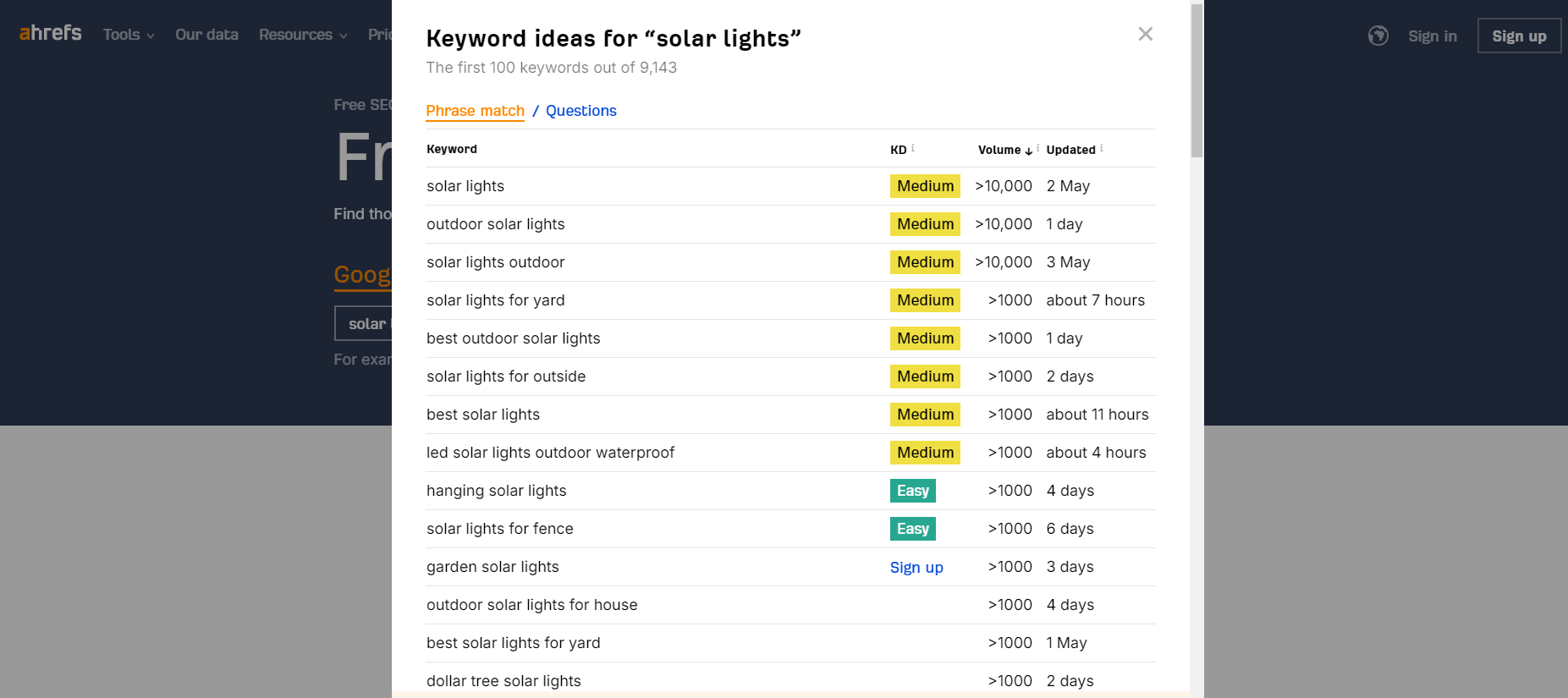
The paid tool is where Ahrefs truly shines. It offers advanced filtering and sorting options, making it easier for users to refine their keyword research. This feature saves time and enhances the efficiency of keyword research, allowing users to identify and target the best opportunities quickly.
The keyword generator also integrates seamlessly with other Ahrefs SEO tools for on-page SEO, link building, technical SEO, and local SEO. This integration provides a holistic view of SEO performance, enabling users to monitor the effectiveness of their keyword strategies and make data-driven adjustments as needed.
3. AnswerThePublic
Want to know exactly what questions your target audience is asking about your topic? AnswerThePublic is your new best friend.
This free tool pulls data from Google and Bing’s auto-suggest feature to show you the most common search queries related to your keyword. It visualizes the data in a cool “search cloud” that categorizes the questions into what, why, where, and how.
For example, if you type in “solar lights”, the tool will show you questions like:
- What solar garden lights are best?
- How do solar lights work at night?
- Are solar lights waterproof?
- Why do solar lights need batteries?
- Can solar lights catch fire?
- Will solar lights charge in the shade?
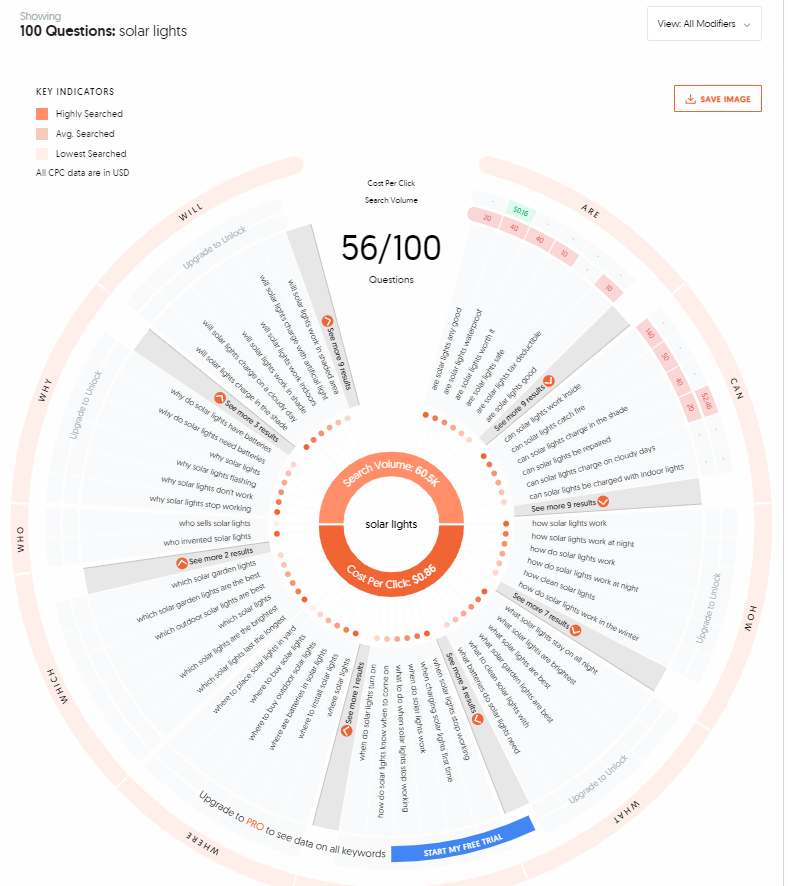
As you can see, AnswerThePublic is great for mining long-tail keywords. Answer each question in an in-depth, helpful blog post to outrank your competition and drive qualified traffic to your site.
4. Keyworddit
Keyworddit is a specialized keyword research tool designed to extract keywords that reflect real-world language and interests from Reddit’s vast and diverse user-generated content. This feature is particularly useful for identifying niche keywords and phrases that might not appear in more conventional keyword tools, providing users with unique insights into what their target audience is discussing and searching for online.
Another significant feature of Keyworddit is its simplicity and ease of use. Users only need to input a subreddit related to their topic or industry, and Keyworddit will generate a list of keywords from the most recent posts and comments within that subreddit.
Keyworddit also provides contextual information by displaying the Reddit threads where the keywords were found. This feature allows users to see how the keywords are being used in natural conversations, offering deeper insights into the context and relevance of each keyword.
Keyworddit has become an even more important tool with Google now favoring Reddit content in its search engine results. By exploring the keywords and discussions within specific subreddits, you can identify trending topics and common questions or concerns among your target audience. This insight can guide the creation of content that addresses these topics directly, potentially increasing engagement and traffic.
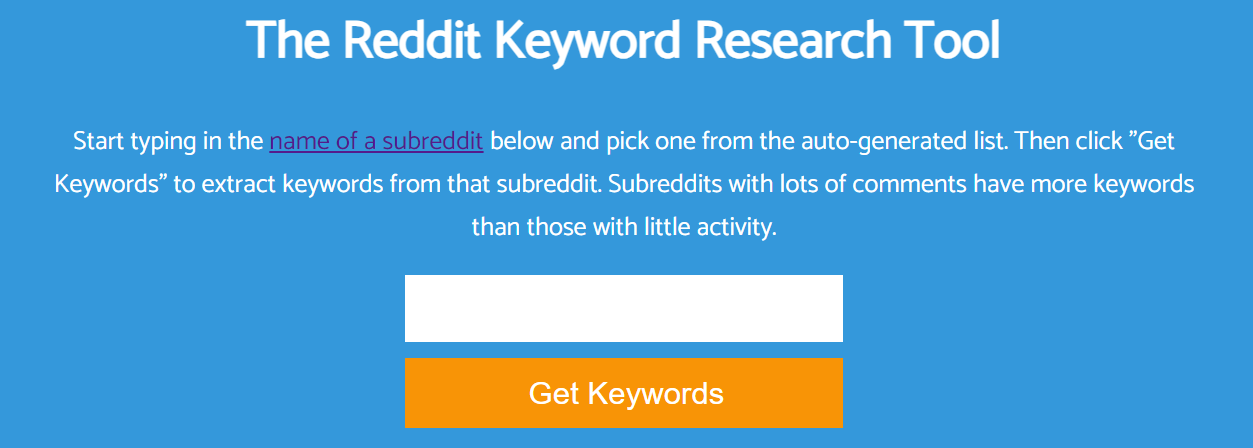
Content Creation and Optimization Tools
Now that you have a list of keywords, it’s time to create your content. Here are some of my favorite tools for creating and optimizing both written and visual content.
5. BrandWell
As someone who creates a lot of SEO content, I’m always on the lookout for tools to streamline my workflow and ensure my content is fully optimized. That’s where the RankWell long-form writer shines.
Thanks to this incredible tool, I’ve been able to scale my content production to new heights while ensuring every piece is not only SEO-friendly but also a genuine pleasure to read.
There are six ways to create content with RankWell: enter a long-tail keyword, a YouTube URL, a podcast URL, an existing blog post URL, a custom audio file, or a Word/Doc/PowerPoint file.
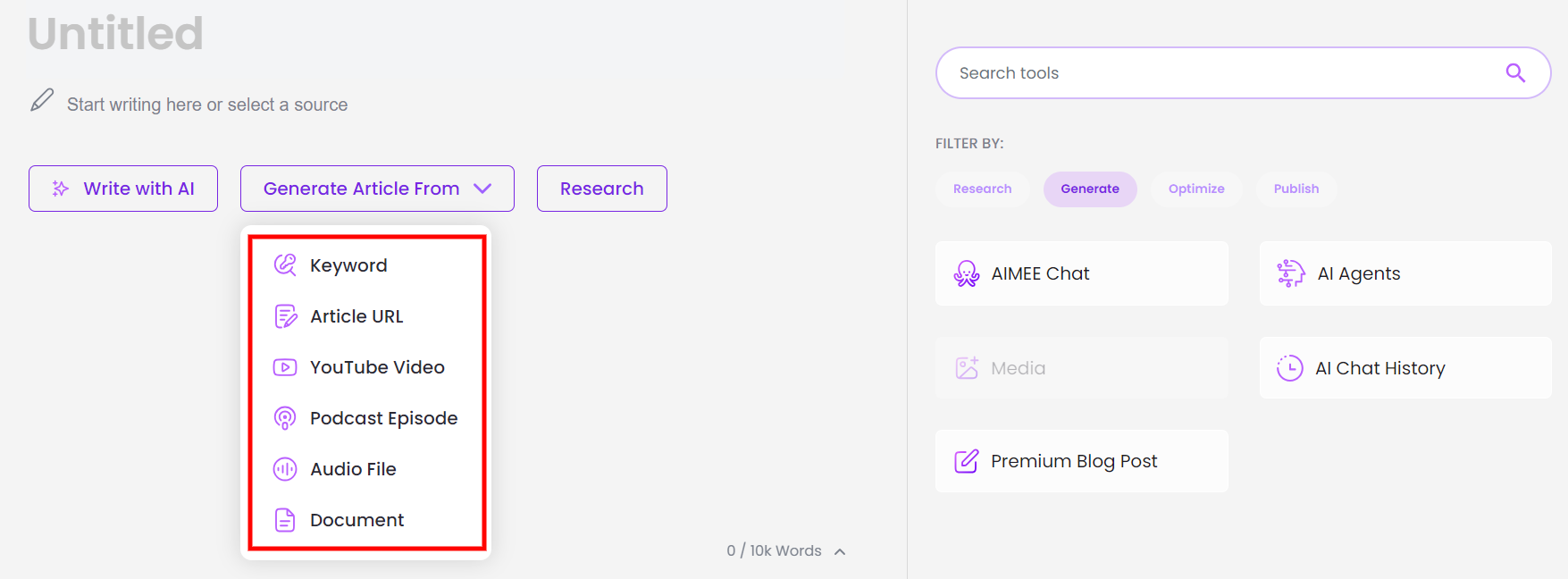
In under 10 minutes, you get a complete blog post that’s almost publish-ready. Everything is done for you — title tag, meta description, URL slug, table of contents, H1-H5 headers, bullet points or numbered lists, key takeaways, and an introduction and conclusion.
One of my favorite things about BrandWell is how it handles content optimization. It automatically incorporates your target keywords and ensures the content follows SEO best practices, so you can focus on the writing itself.
Plus, you get to see your SEO stats, score, and checklist updated in real time as you edit your blog post.
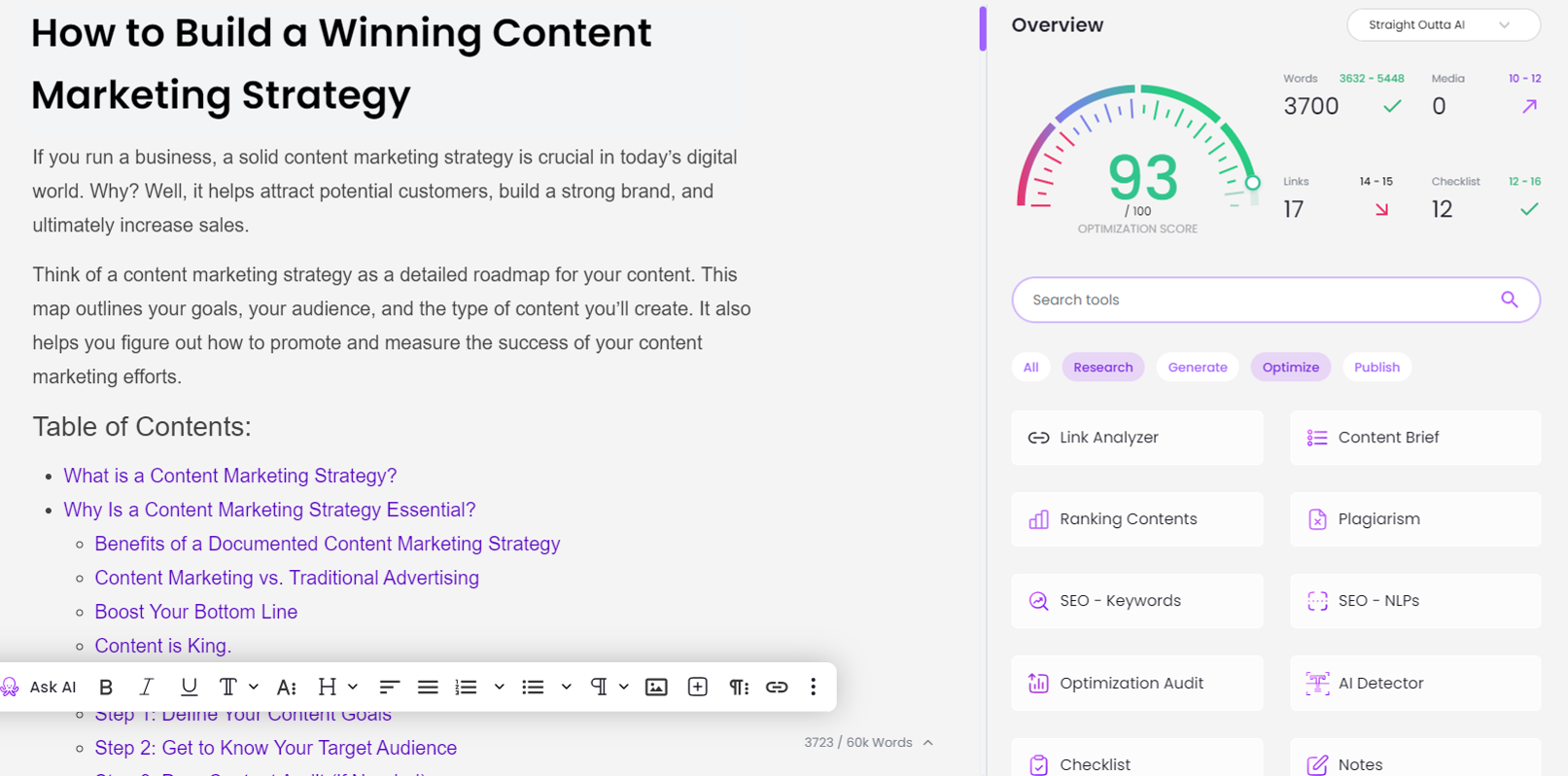
After optimizing your article, just hit Publish and it will automatically go live on your WordPress or Shopify blog.
6. Grammarly
No matter how experienced a writer you are, it’s always good to have a second set of eyes on your content. That’s where Grammarly comes in — it’s like having a super-powered proofreader at your fingertips.
I use Grammarly religiously for all my website content, and it never fails to catch things I might have missed. From simple spelling and grammar errors to more complex suggestions around clarity and readability, it helps ensure my content is polished and professional.
Grammarly goes above and beyond simple error correction, offering powerful content optimization features. Its suggestions help you craft clearer, more engaging writing that captures your audience’s attention and boosts your SEO rankings.

7. Yoast SEO
If you’re running a WordPress site, Yoast SEO is an absolutely essential plugin. I’ve been using it for years and it’s made a huge difference in my on-page SEO.
Yoast looks at your keyword usage, meta description, title tag, and readability, then gives you specific recommendations to optimize them.
I particularly love Yoast’s readability analysis. It helps me ensure my content is accessible and engaging for readers, not just search bots. Things like sentence length, paragraph size, subheading distribution, and passive voice are all taken into account.
Another great thing about Yoast is how it helps with technical SEO elements like sitemaps and breadcrumbs. It takes a lot of the guesswork and manual labor out of the process.
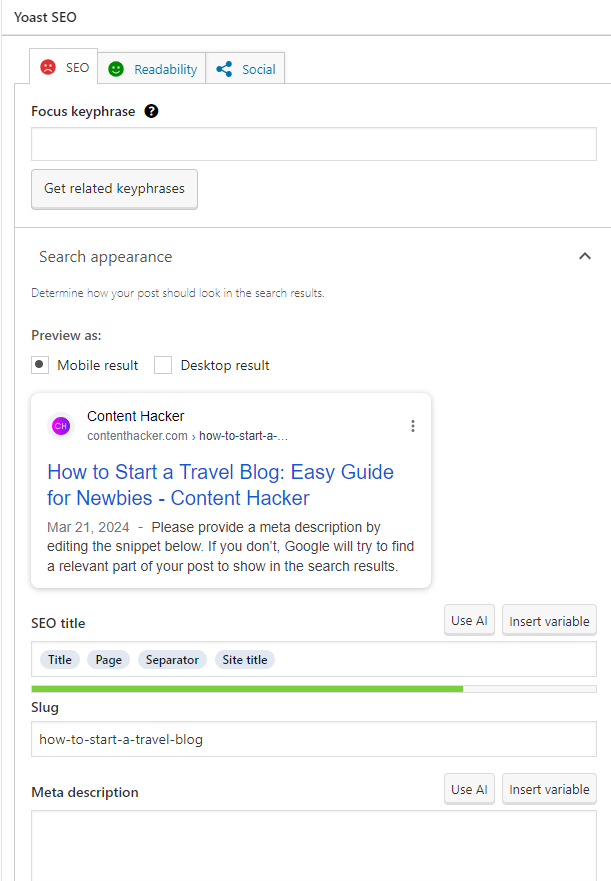
8. Canva
As a marketer or small business owner, you’re no stranger to the importance of eye-catching visuals for your website and social media presence. But who has the time or money to spend on creating graphics, especially if you’re not a design whiz? Canva is the perfect DIY SEO tool for all things visual.
Canva, a free graphic design tool, simplifies the process with its intuitive drag-and-drop interface and an impressive collection of templates, allowing you to craft professional-looking images in a matter of minutes.
Don’t have high-quality photos? No problem. Canva has a built-in stock photo library with millions of images to choose from. Many are free, while premium images are very affordable.
AI has arrived at Canva! Now you can generate all sorts of images from a single prompt.
 If you want to take your design game to the next level, check out the Canva Design School. Dive into a treasure trove of tutorials, courses, and creative sparks that’ll have you whipping up eye-catching visuals in no time.
If you want to take your design game to the next level, check out the Canva Design School. Dive into a treasure trove of tutorials, courses, and creative sparks that’ll have you whipping up eye-catching visuals in no time.
9. Midjourney
Speaking of visuals, have you heard of Midjourney? It’s an AI image generator that can create unique, high-quality graphics based on a text description. Sounds like magic, right?
I use Midjourney a lot and I’ve been blown away by the images it can generate. You simply enter a prompt describing what you want (e.g. “a cozy living room with a fireplace and cat sleeping on the rug”) and it spits out four different image variations.
Here’s one of the images it created from our sample prompt:

Stock photos can be generic and overused. But with Midjourney, you can generate completely original images that perfectly match your content.
For example, let’s say you’re writing a blog post about the benefits of meditation. You could use Midjourney to generate a peaceful, serene image of someone meditating in nature. This would be more impactful than a cheesy stock photo.
With Midjourney, you can let your creativity run wild. Craft stunning graphics, illustrations, and even product mockups that are sure to catch the eye. The best part? You can use these images royalty-free on your website or social media channels without any licensing headaches.
10. Tiny PNG
Page speed is a crucial ranking factor for SEO. The faster your website loads, the better. But one thing that can really slow down your site is large image file sizes.
That’s where Tiny PNG comes in. It’s a free tool that can compress your images without losing quality. Just drag and drop your images and it will optimize them in seconds.
I run all my website images through Tiny PNG before uploading them. It can reduce file sizes by up to 80% without any visible loss in quality, which helps my pages load lightning-fast.
Tiny PNG also has a WordPress plugin that can automatically compress images as you upload them. Set it and forget it. Your images will be optimized without any extra work on your part.

Other DIY SEO Tools
In this final category, you will find do it yourself SEO tools for tracking your website’s SEO performance, analyzing your backlink profile (and your competitors), running a comprehensive SEO audit, and finding new topics for your content research.
11. Google Analytics
You can’t improve what you don’t measure. That’s why every website needs Google Analytics. It’s a free web analytics tool that gives you detailed insights into your traffic and user behavior, such as:
- How many people visited your site
- What pages did they visit
- How long they stayed on each page
- What actions did they take (e.g. filling out a form, making a purchase)
- Where your traffic is coming from (e.g. search engines, social media, referral links)
SEO gold lies in this data. Discover which pages are search engine superstars, driving tons of organic traffic. But don’t forget to keep an eye out for pages with high bounce rates — they might need some TLC to keep visitors engaged.
Wondering how people are finding your website through search engines? Google Analytics reveals the keywords that are leading folks straight to your virtual doorstep. Take that information and weave those keywords into your content, and watch as even more visitors come knocking.
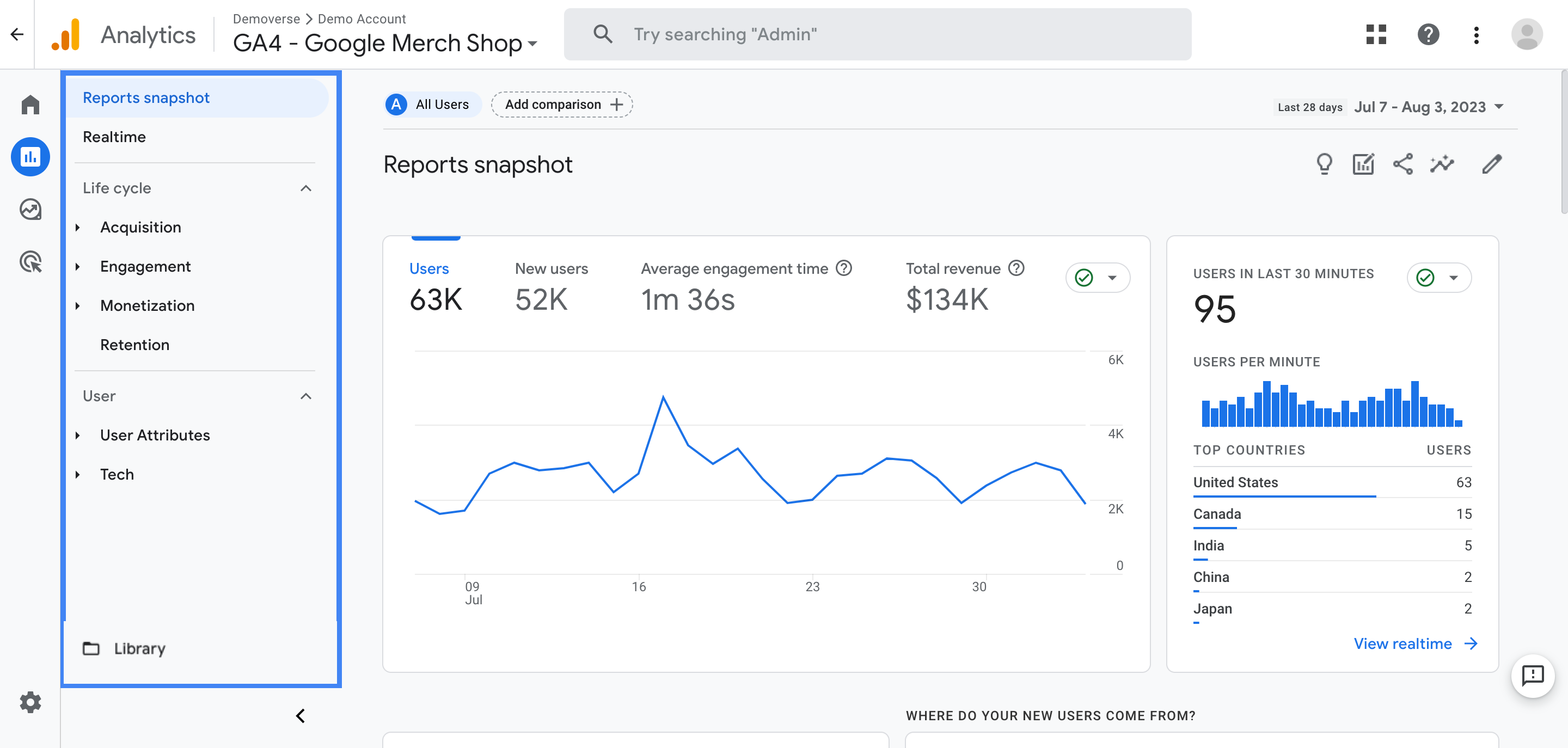
I’m a bit of a Google Analytics junkie, checking my data on the daily. It’s like a secret weapon for tracking my SEO progress and making smart moves based on cold, hard facts.
For instance, if I notice a page raking in organic traffic but losing people left and right, it’s a clear sign to spruce up the content and make it stickier.
Google Analytics helps guide your SEO journey, revealing valuable insights and opportunities that would otherwise remain hidden. Don’t try to navigate without it.
12. Google Search Console
If you’re serious about SEO, you need to get intimate with Google Search Console. It’s a free tool provided by Google that gives you invaluable insights into your site’s performance in search results.
With Search Console, you can see which queries are driving organic traffic to your site, monitor your average rankings and click-through rates, and identify any issues that might be holding back your visibility, like crawl errors or manual actions.
It’s also where you can submit your sitemap to help Google discover and index your pages more efficiently.
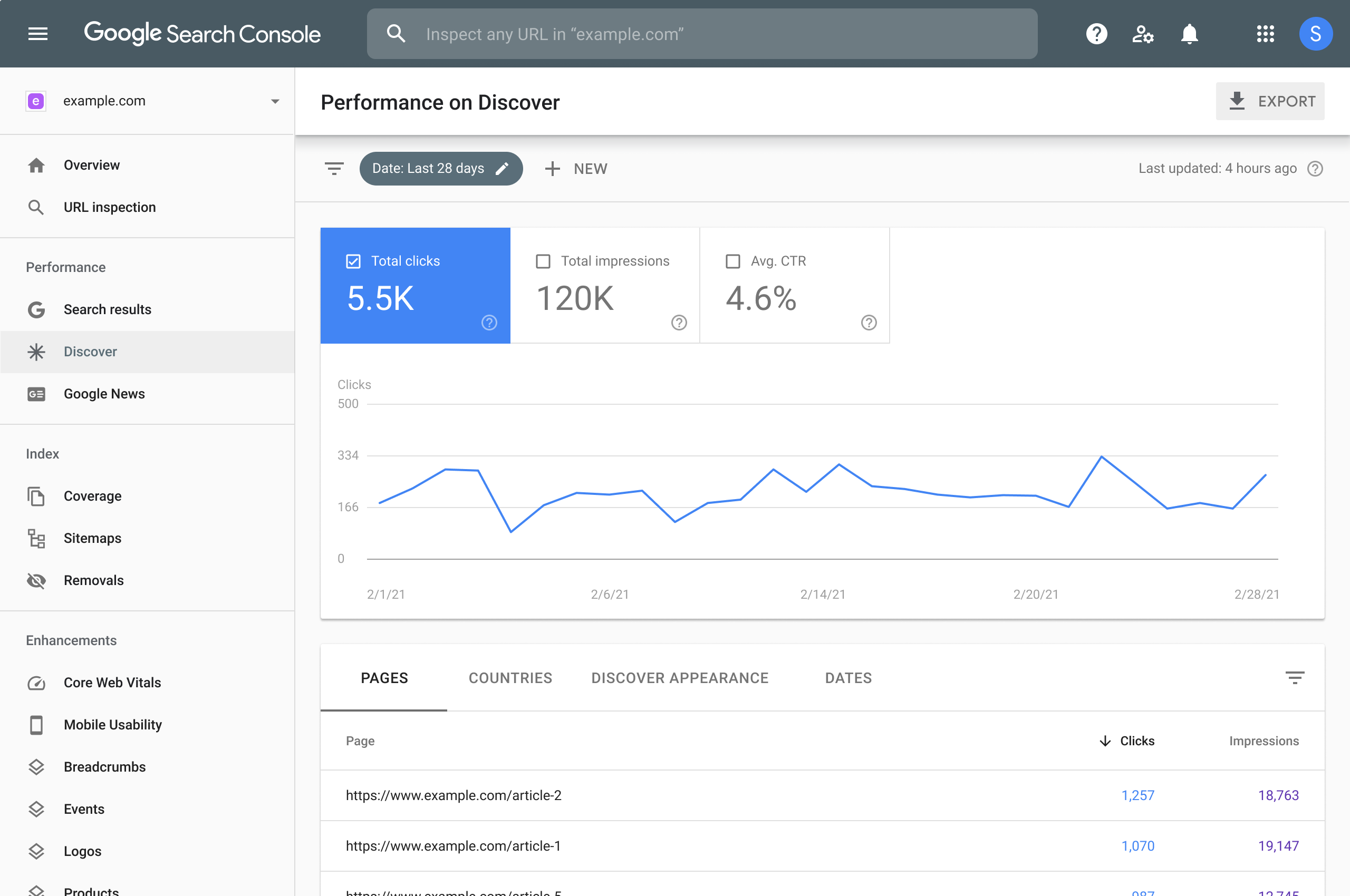
View the “Performance” report to see your top queries, pages, countries, devices, and more. This is a goldmine of keyword data you can use to inform your content strategy.
The “Mobile Usability” and “Core Web Vitals” reports are also important for gauging your site’s technical health and user experience.
Search Console lets you monitor your backlink profile too under the “Links” report. While not as comprehensive as paid tools, it’s still useful to see your top linked pages and discover any spammy links you may want to disavow.
Bottom line – if you want to succeed in SEO, you need to master Google Search Console. It takes some time to explore all the features and reports, but it’s well worth the effort.
13. Semrush Backlink Analytics
Speaking of backlinks, Semrush is one of my secret weapons for running a full SEO audit. Their Backlink Analytics suite is insanely powerful for dissecting your backlink profile and finding new link opportunities.
Semrush shows you all your backlinks, including the linking page, anchor text, authority score, and toxicity level. You can easily identify your strongest links to replicate and any shady links to clean up or disavow.
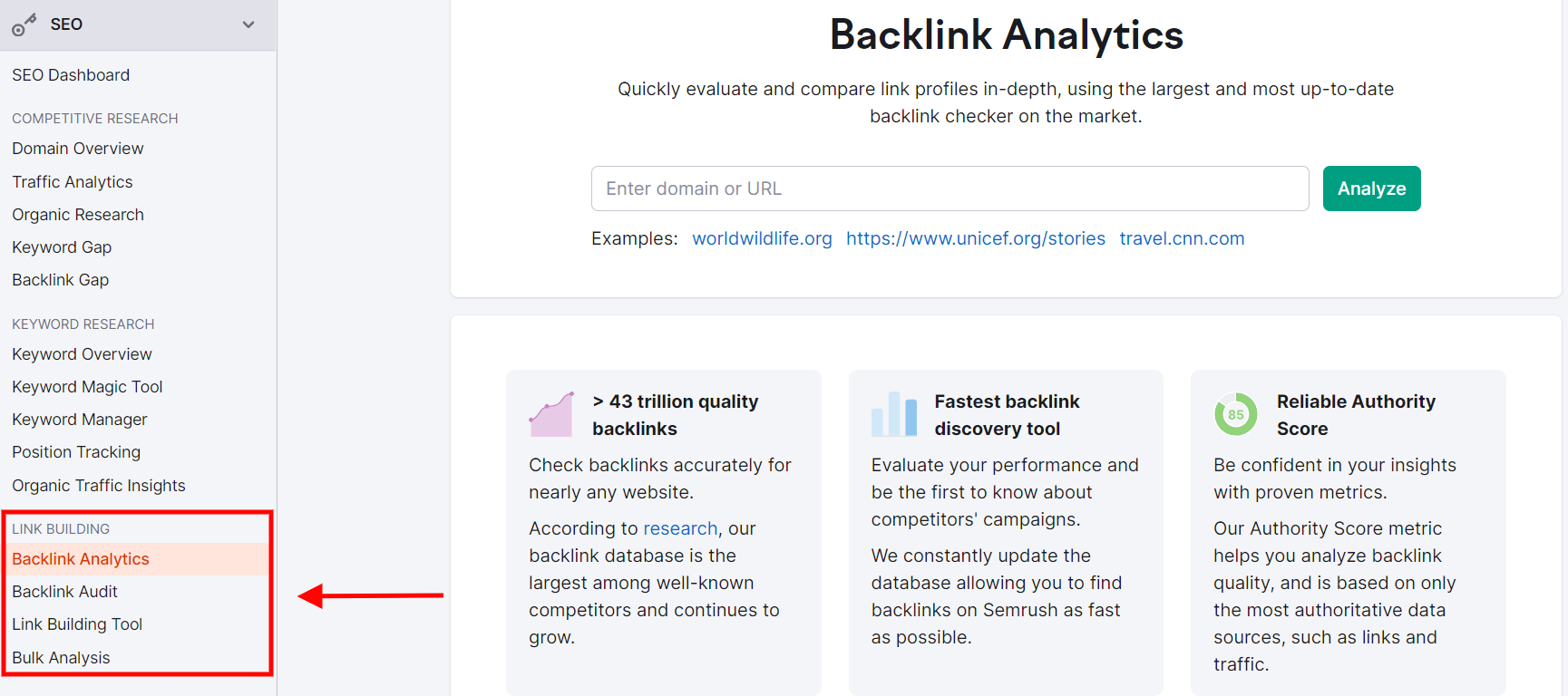
But here’s where it gets really fun — you can also use Semrush to spy on your competitors’ backlinks and reverse-engineer their link-building strategies.
Just enter a rival domain and boom, you can see every link they’ve earned, sorted by authority and relevance.
This competitive intel is a goldmine for link building. You can spot websites that are linking to multiple competitors and pitch your own content as a resource. Or find broken links on high-authority sites and suggest your page as a replacement. The possibilities are endless.
I’ve landed some of my best backlinks by replicating competitors’ tactics I discovered through Semrush. For example, I once found a bunch of their links coming from guest posts on industry blogs. So I reached out to those same blogs with my own guest post ideas and snagged several juicy links as a result.
Semrush is an all-in-one SEO suite with keyword research, site audits, and rank tracking too. If link building is a priority for you (which it should be), I highly recommend adding Semrush to your DIY SEO toolkit.
14. Screaming Frog
Screaming Frog is a website crawler that allows you to perform a comprehensive SEO audit of your site – or really any site – in minutes.
I’ve been using Screaming Frog for years and it never ceases to amaze me how many technical SEO issues it can uncover. Things like broken links, duplicate content, missing meta tags, redirect chains – all the stuff that can tank your rankings if left unchecked.

Here’s how it works: you enter a URL and Screaming Frog will crawl that page and all its subpages, up to 500 URLs on the free version. It then generates a detailed report with over 50 different SEO data points for each URL.
Some of the key things I look at in the report are:
- Status codes (200s, 301s, 404s, etc.)
- Page titles and meta descriptions
- H1 and H2 headings
- Word count and content duplication
- Internal and external links
- Images and alt text
- Directives like noindex/nofollow
It’s basically a full MRI of your website’s SEO health. You can quickly diagnose any major issues and export the data to Excel for further analysis.
But Screaming Frog isn’t just useful for auditing your own site. You can also use it to scope out your competitors’ SEO and find weaknesses to exploit.
I once used Screaming Frog to crawl a competitor’s e-commerce site and found hundreds of thin, duplicate product pages. This told me they were spreading their content and link equity too thin. So I made sure to beef up my own product descriptions and consolidate similar pages to avoid the same fate.
While Screaming Frog has a bit of a learning curve, it’s well worth taking the time to master. The level of detail and insight it provides is unmatched by most other SEO tools. Plus, the free version is super generous – 500 URLs is more than enough for most small to medium sites. If you’re serious about SEO, you need Screaming Frog in your life. It’s the closest thing to X-ray vision for your website.
15. BuzzSumo
As much as I love geeking out on technical SEO, at the end of the day, content is still king. And when it comes to content research and ideation, BuzzSumo is one of my go-to tools.
BuzzSumo is a content analysis platform that shows you the most popular content for any topic or competitor. You can see which articles got the most social shares, backlinks, and comments across different networks like Facebook, Twitter, Pinterest, and Reddit.
One of my favorite ways to use BuzzSumo is to discover trending topics in my niche. I just enter a broad keyword and it shows me the hottest related content from the past day, week, month, or year. This helps me stay on top of what’s buzz-worthy and inspires ideas for my own content.

For example, I once saw an article about “content shock” blowing up on BuzzSumo. This was a new concept to me at the time, so I dug into the original article and ended up writing my own spin on it. That post ended up being one of my most successful ever, largely thanks to the timely topic I discovered through BuzzSumo.
Another great use for BuzzSumo is analyzing your competitor’s content performance. Just plug in their domain and you can see their most shared articles of all time, plus who’s linking to and tweeting about them. This intel is super valuable for content optimization.
You can spot which topics and formats resonate best with your target audience and then put your own unique twist on them. You can also find influencers and thought leaders who might be willing to share or link to your content.
Of course, BuzzSumo isn’t just for research – it’s also a great tool for amplifying your content. After I publish a new post, I use BuzzSumo to see who’s shared similar content in the past and reach out to them. This has helped me get more eyeballs on my work and build relationships with influencers.
Overall, if you want to take your content strategy to the next level, BuzzSumo is a must-have tool. It takes a lot of the guesswork out of what to write about and how to promote it.
FAQs: Do It Yourself SEO Tools
Can I do SEO by myself?
Absolutely. With a bit of research and the right Do it Yourself SEO tools, you can optimize your site without breaking the bank.
What is the best SEO tool to use?
Semrush tops many lists for its comprehensive features that tackle everything from keyword research to site audits.
How to do SEO at home?
Start with keyword research, then move on to optimizing your content and building quality backlinks. Don’t forget about monitoring your progress with Google Analytics.
Does Google have free SEO tools?
Yes, Google offers several free tools like Google Analytics and Google Search Console that are crucial for any DIY SEO effort.
Conclusion
Say goodbye to the guessing game of SEO! With this powerful collection of 15 do it yourself SEO tools, you’ll be ready to climb those search rankings, leaving your rivals in the dust.
From keyword research to on-page optimization, link building to rank tracking, you’re now equipped to be your own SEO superhero.
Your website is ready for its close-up. Give it the spotlight it craves and watch your audience grow.

UNLOCK YOUR POTENTIAL
Long Headline that highlights Value Proposition of Lead Magnet
Grab a front row seat to our video masterclasses, interviews, case studies, tutorials, and guides.



